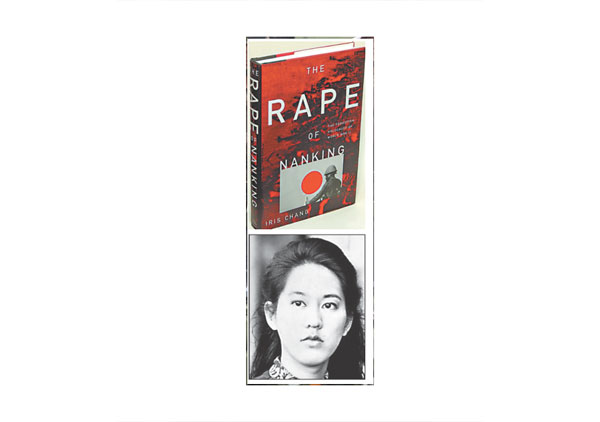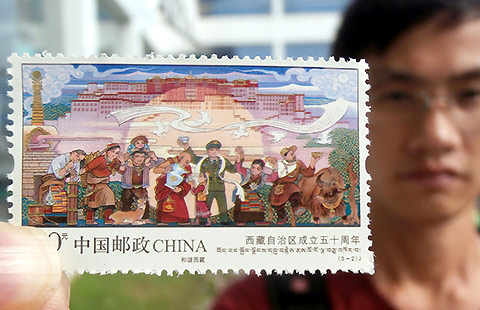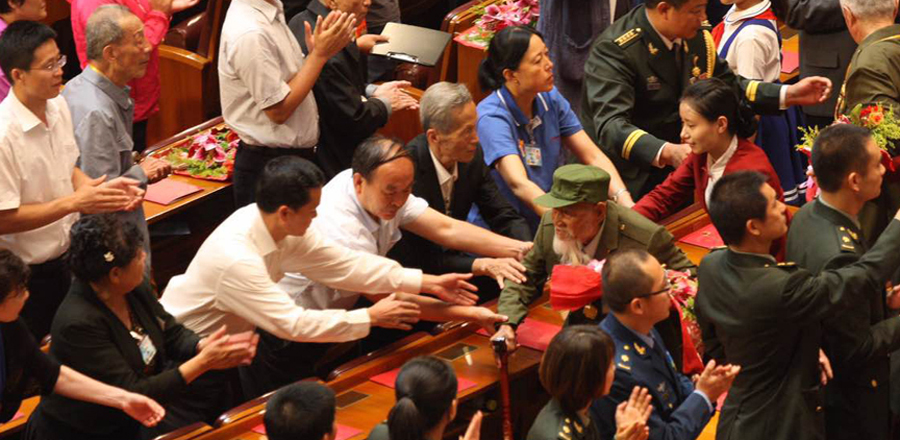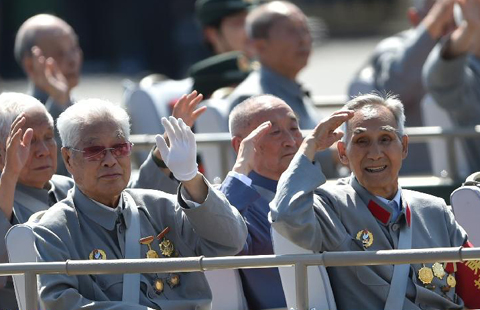Mother says pain of daughter's death 'will never subside'
Updated: 2015-09-07 07:46
By ZHAO XU(China Daily)
|
||||||||
 |
|
The Rape of Nanking and its author, Iris Chang.[Photo/China Daily] |
"My daughter's suicide bears no relation to her penning of the book," said Ying-Ying Chang, mother of The Rape of Nanking author Iris Chang.
Back in 1997, her daughter Iris published her groundbreaking work on what's known today as the Nanjing Massacre, in which at least 300,000 Chinese civilians and unarmed soldiers were killed by invading Japanese troops during a six-week rampage starting in December 1937.
Iris, a journalism graduate from the University of Illinois and a second-generation Chinese immigrant in the United States, committed suicide in 2004, at the age of 36.
Chang is currently in Beijing with her husband after being invited by the Chinese government to witness the parade in Tian'anmen Square on Thursday.
"It's an education," said Chang, about the parade to commemorate the 70th anniversary of the end of the Chinese People's War of Resistance against Japanese Aggression (1937-45). "People, either Chinese or non-Chinese, have to be reminded from time to time what happened more than 70 years ago. It is for the sake of the future, not the past."
Over the past decade, Chang has been to China many times, the first time being in 2005, when a bronze sculpture of Iris was unveiled at the Memorial Hall of the Victims of the Nanjing Massacre by Japanese Invaders.
Each trip has inevitably brought up memories of their daughter, her life and her death.
"It's hard for us, the pain left by the death of our daughter will never subside," said Chang. "But the courage and determination with which Iris wrote the book, before she turned 30, has motivated us to push forward what she has left behind."
According to Chang, Iris "as a kid would always be upset by any injustice she saw, even at school". She started to work on the book around 1995.
"Research led her to the Library of Congress in Washington DC and to the Yale University Library, where she discovered the diaries of Minnie Vautrin, a US missionary in wartime Nanjing who had helped save over 10,000 Chinese women," Chang said. "She also went to Nanjing, where she sought out survivors of the massacre and talked to them, as well as Taiwan, where many important wartime documents were kept."
The book was an instant sensation, remaining at the top of The New York Times' best-seller list for three weeks running. But according to Chang, her daughter was attacked by right-wing militarists from both Japan and the United States. And she insisted that Iris' decision to end her own life had nothing to do with her experience of writing The Rape of Nanking.
"There's seven years between the publication of the book and her suicide. And in between that period, she penned another book, The Chinese in America: a Narrative Story," said Chang, a microbiology professor at the University of Illinois.
"Multiple reasons contributed to her suicide. In 2002, she gave birth to a son who was later diagnosed with autism. And in the months leading up to her death, she was taking a type of anti-depression drug that I now believe could increase a person's suicidal tendency."
In her mother's eyes, Iris was always a person who loved life. "I remember her e-mails to me not long before her death in which she talked about the suicide of another writer and expressed her disbelief at that writer's decision," said Chang.
"It's true that writing The Rape of Nanking had given her some hard times, and she had suffered insomnia and hair loss. But when I asked her to stop, she said, 'No'. She said she must speak for those who could no longer do so."
- Three killed, 8 missing after fishing boat capsizing in S.Korea
- Migration crisis tears at EU's cohesion and tarnishes its image
- Britain signals move towards air strikes in Syria
- Snowden accepts Norwegian prize via video link
- Tokyo ditches Olympic logo amid new plagiarism allegation
- Japan criticized for protest over UN chief's visit to Beijing

 50th anniversary of Tibet autonomous region
50th anniversary of Tibet autonomous region
 Red carpet looks at the 72nd Venice Film Festival
Red carpet looks at the 72nd Venice Film Festival
 China beats Russia in 4 sets at volleyball World Cup
China beats Russia in 4 sets at volleyball World Cup
 8th Int'l Military Music Festival 'Spasskaya Tower' begins
8th Int'l Military Music Festival 'Spasskaya Tower' begins
 Downpour floods streets in Beijing
Downpour floods streets in Beijing
 Veterans attend V-Day anniversary gala show
Veterans attend V-Day anniversary gala show
 Military helicopters write number 70 high in the sky
Military helicopters write number 70 high in the sky
 Salute to veterans
Salute to veterans
Most Viewed
Editor's Picks

|

|

|

|

|

|
Today's Top News
Austria, Germany open borders to migrants
Central government steps up economic support for Tibet
China economy enters 'new normal' eyeing 7% growth rate: G20
Troop cuts signal path of peaceful development
Sino-Russian investment fund eyes more deals
Predicting Internet's future without a crystal ball
Silk Road Fund to expand ties with lenders
Intl community echoes Xi's speech at V-Day commemoration
US Weekly

|

|







